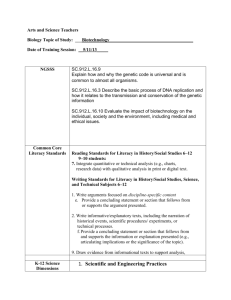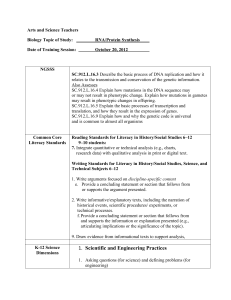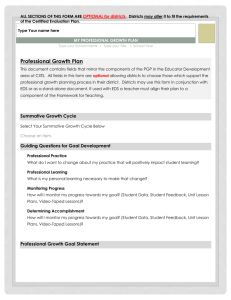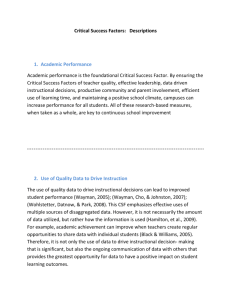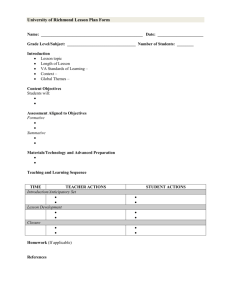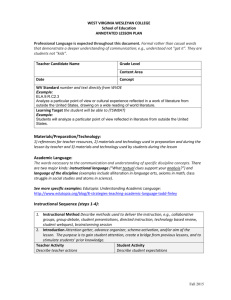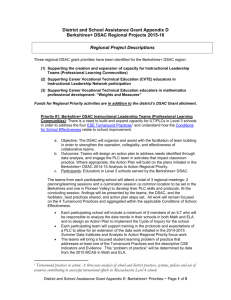323B-220E District and School Assistance Grant
advertisement
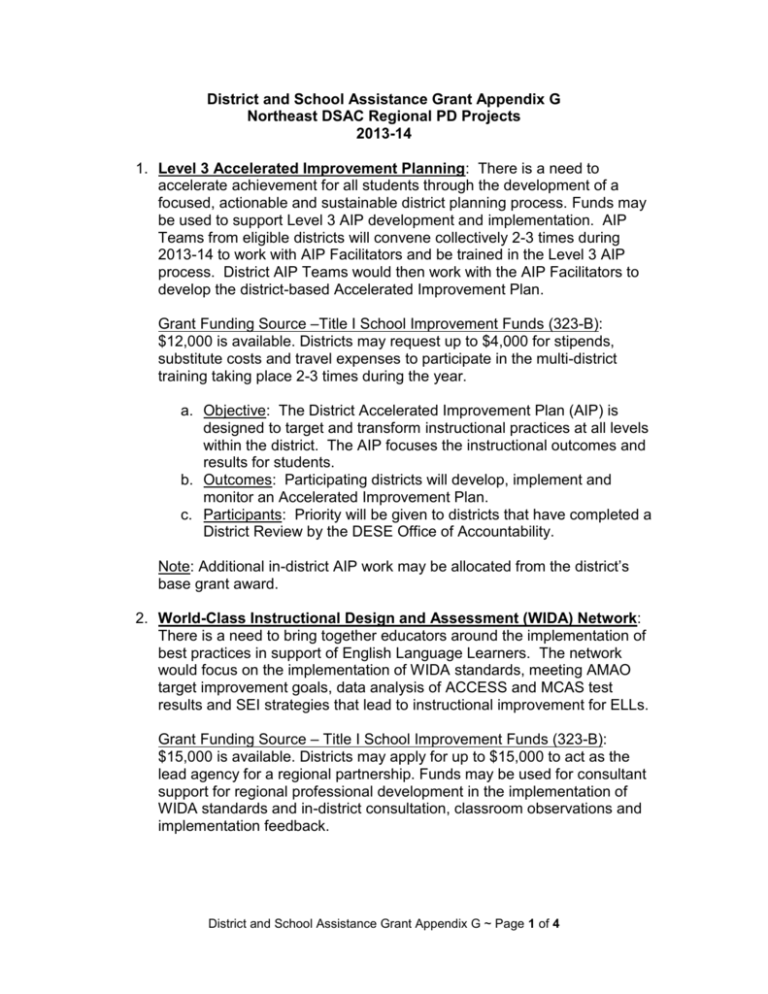
District and School Assistance Grant Appendix G Northeast DSAC Regional PD Projects 2013-14 1. Level 3 Accelerated Improvement Planning: There is a need to accelerate achievement for all students through the development of a focused, actionable and sustainable district planning process. Funds may be used to support Level 3 AIP development and implementation. AIP Teams from eligible districts will convene collectively 2-3 times during 2013-14 to work with AIP Facilitators and be trained in the Level 3 AIP process. District AIP Teams would then work with the AIP Facilitators to develop the district-based Accelerated Improvement Plan. Grant Funding Source –Title I School Improvement Funds (323-B): $12,000 is available. Districts may request up to $4,000 for stipends, substitute costs and travel expenses to participate in the multi-district training taking place 2-3 times during the year. a. Objective: The District Accelerated Improvement Plan (AIP) is designed to target and transform instructional practices at all levels within the district. The AIP focuses the instructional outcomes and results for students. b. Outcomes: Participating districts will develop, implement and monitor an Accelerated Improvement Plan. c. Participants: Priority will be given to districts that have completed a District Review by the DESE Office of Accountability. Note: Additional in-district AIP work may be allocated from the district’s base grant award. 2. World-Class Instructional Design and Assessment (WIDA) Network: There is a need to bring together educators around the implementation of best practices in support of English Language Learners. The network would focus on the implementation of WIDA standards, meeting AMAO target improvement goals, data analysis of ACCESS and MCAS test results and SEI strategies that lead to instructional improvement for ELLs. Grant Funding Source – Title I School Improvement Funds (323-B): $15,000 is available. Districts may apply for up to $15,000 to act as the lead agency for a regional partnership. Funds may be used for consultant support for regional professional development in the implementation of WIDA standards and in-district consultation, classroom observations and implementation feedback. District and School Assistance Grant Appendix G ~ Page 1 of 4 a. Objective: To provide support for Level 3 districts in the analysis of ACCESS and MCAS student performance data and the application of WIDA standards to support improvement for ELLs. b. Outcomes: Participants will analyze ACCESS test results and subgroup MCAS data and develop strategies to strengthen instructional practices to support academic achievement for English Language Learners. c. Participants: Participation in the WIDA Network is open to all Northeast Region Level 3 districts. Priority for in-district consultation will be given to districts that did not meet AMAO Targets (Haverhill, Methuen, Peabody and Salem) 3. Math Network Seminars: There is a need to support math professional development for the NE DSAC Math Instructional Leaders Network. Funds will be used to deliver 2-3 half day seminars focused on best practices in math with a focus on working with “struggling students,” implementation of the Common Core State Standards / Massachusetts Mathematics Curriculum Framework and the Standards of Mathematical Practice. The network will support connections with Educator Evaluation goals and measurements. Grant Funding Source – State Targeted Assistance Funds (220-E): $3,000 is available. Districts may apply for up to $3,000 to act as the lead agency for a regional partnership. Funds may be used for consultant support to provide up to three, half day (4 hour) training on selected topics in math instructional practices. a. Objective: The NE DSAC Math Instructional Leaders Network (Math ILN) provides regional support to instructional leaders in mathematics. The Math ILN meets six times per year to share best practices in mathematics. The Math Network Seminars will provide an opportunity to dig deeper into strategies that support instructional practice for all students and increased student achievement for “struggling students” in the area of mathematics. b. Outcomes: Participants will learn about effective strategies and resources and have a chance to implement these strategies in the classroom. c. Participants: Priority will be given to Level 3 districts and active members of the Math Instructional Leaders Network. 4. Literacy Network Seminars: There is a need to support professional development for the NE DSAC Literacy Partnership Network. Funds will be used to deliver 2-3 half day seminars focused on best practices in literacy with a focus on working with “struggling students,” implementation of the Common Core State Standards and the Massachusetts ELA / District and School Assistance Grant Appendix G ~ Page 2 of 4 Literacy Framework. The network will support connections with Educator Evaluation goals and measurements. Grant Funding Source – State Targeted Assistance Funds (220-E): $3,000 is available. Districts may apply for up to $3,000 to act as the lead agency for a regional partnership. Funds may be used for consultant support to provide up to three, half day (4 hour) training on selected topics in literacy. a. Objective: The NE DSAC Literacy Partnership Network) provides regional support to instructional leaders in English Language Arts and Literacy. The Literacy Partnership Network meets to share best practices reading, writing, listening and speaking. The Literacy Network Seminars will provide an opportunity to dig deeper into strategies that support instructional practice for all students and increased student achievement for “struggling students” in the area of literacy. b. Outcomes: Participants will learn about strategies and resources and have an opportunity to practice these strategies in the classroom. c. Participants: Priority will be given to Level 3 districts and active members of the Literacy Partnership Network. 5. Curriculum & Instructional Leadership Workshops: There is a need to support ongoing district work in curriculum planning and implementation of high quality instructional practices in such areas as curriculum mapping and alignment to the Common Core State Standards, implementation of the “Model Curriculum Units,” curriculum design using the “Understanding by Design Model,” evaluation of curriculum units and the design and implementation of ‘curriculum embedded performance assessments.” Grant Funding Source – Title I School Improvement Funds (323-B): $10,000 is available. Districts may apply for up to $10,000 to act as the lead agency for a regional partnership. Funds may be used for consultant support for workshop training in curriculum mapping, backwards design, development of curriculum embedded performance assessments, and use of high quality rubrics to assess curriculum units, and for in-district consultation. a. Objective: To provide training in curriculum and instructional practices to district and school curriculum leaders. b. Outcomes: Participants at the workshops will develop a district curriculum plan to implement high quality curriculum units that are aligned with the MA Curriculum Frameworks, and will align the work with Educator Evaluation Implementation. District and School Assistance Grant Appendix G ~ Page 3 of 4 c. Participants: Priority will be given to Level 3 districts that have agreed to implement the “Model Curriculum Units” and have initiated curriculum mapping and benchmark assessments. District and School Assistance Grant Appendix G ~ Page 4 of 4


